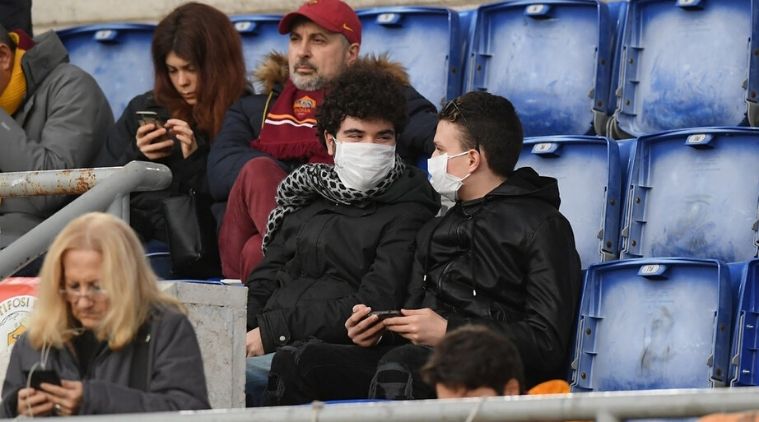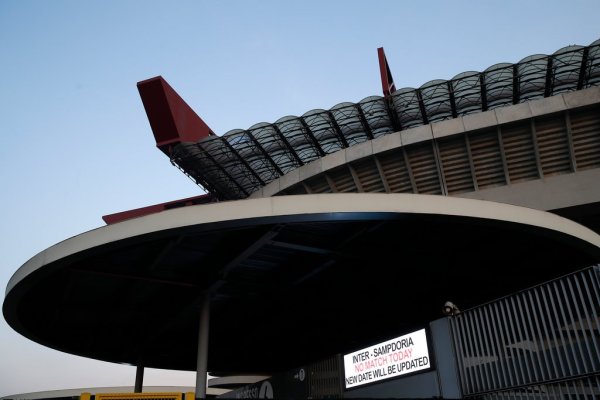 Some fans wore masks to a soccer match in Rome on Sunday. Four other league games in Italy were postponed amid a coronavirus outbreak.Credit…Alberto Lingria/Reuters
Some fans wore masks to a soccer match in Rome on Sunday. Four other league games in Italy were postponed amid a coronavirus outbreak.Credit…Alberto Lingria/Reuters
By Tariq Panja and John Duerden
In China, officials struggling to contain the spread of the coronavirus have delayed the start of the soccer season for months, and at least one top-division team has been marooned in the Middle East for weeks, unable to return from a preseason training camp.
In South Korea, fans attending matches earlier this month were checked for fever before being allowed inside stadiums, and masks were ubiquitous in the stands in Japan recently — until Tuesday, when officials announced that there will be no league play until at least mid-March.
But the effects of the coronavirus on the global soccer calendar have crossed borders, too. Asia’s soccer confederation announced three weeks ago that the matches in its biggest club championship involving Chinese teams would not be played for several months, and Vietnam has banned the hosting of sporting events of any kind this month, forcing even more games to be rescheduled.
Now the disruption has spread to Europe.
In Italy, where the number of confirmed coronavirus cases neared 300 on Tuesday, at least one game — the second leg of a knockout tie on Thursday between Internazionale of Milan and Ludogorets of Bulgaria in the Europa League — is to be played behind closed doors as authorities continue to restrict public gatherings in the northern region of Lombardy.
 Inter Milan canceled its league match on Sunday at the city’s San Siro stadium. On Thursday, it will play a Bulgarian opponent behind closed doors.Credit…Antonio Calanni/Associated Press
Inter Milan canceled its league match on Sunday at the city’s San Siro stadium. On Thursday, it will play a Bulgarian opponent behind closed doors.Credit…Antonio Calanni/Associated Press
The decision on Tuesday to play the game without spectators came after Italian authorities postponed four league games last weekend.
Inter Milan, a top contender for the Italian league title, said the decision was a result of several days of talks with health officials in Lombardy and European soccer’s governing body, UEFA, over how to stage the game, which could not be canceled because of the lack of alternate dates.
The game against Ludogorets is believed to be the first time a European soccer match has had to be played behind closed doors because of a health crisis. Usually such conditions are imposed on teams as a punishment for fan violence or racist episodes.
Inter, which is owned by a Chinese company, had already been taking steps to minimize the risks to its staff members from the virus. Nonessential employees have been told to work from home, and the club has purchased stocks of face masks and hand sanitizer for the team’s headquarters.
The decision to go ahead with Thursday’s match at Milan’s cavernous San Siro stadium was confirmed on Tuesday. Inter, which has an even bigger game on Sunday, when it is scheduled to visit first-place Juventus, was one of the four Italian clubs that postponed a match in the country’s top league last weekend.
Other European countries are now contemplating similar possibilities. On Tuesday, French club Olympique Lyonnais said in a statement that it had “taken note” of French authorities’ decision to let its match against Juventus in the Champions League proceed “in its initial configuration” on Wednesday night. Up to 3,000 fans of Juventus, a team based in the northern Italian city of Turin, are expected for the game, which is sold out.
Asked about the match, Olivier Véran, France’s health minister, told RTL radio that authorities were being vigilant but that there were currently “no scientific and medical arguments” justifying the cancellation of large events in France.
Read | From Olympics to World Cup, all the sports events affected by coronavirus outbreak
“Should we stop Fashion Week?” Véran said. “Should we stop games? Should we close universities? The answer is no.”
He added, “We are not closing the borders because we do not know how to, but because it would make no sense at this stage.”
Health officials and governments in Asia, where sports schedules have been most affected since the virus first started to spread, are facing a far different reality.
When Afshin Ghotbi, the Iranian-American coach of Chinese team Shijiazhuang Ever Bright, was thrown into the air by his soccer players in early November after clinching promotion to the Chinese Super League, he had no inkling that almost four months later, he and his squad would still be waiting for the new season to begin.
Shijiazhuang Ever Bright, whose home city of 11 million is about 165 miles southwest of Beijing, should have kicked off its new campaign last weekend. But instead of taking on Chinese superclubs like Guangzhou Evergrande and Shanghai SIPG in front of 40,000 fans, Ghotbi’s team is playing preseason games in empty stadiums in Abu Dhabi, United Arab Emirates, its base for five weeks and counting.
Team officials said that they did not expect to play competitive soccer until at least May or even be allowed to return to China before mid-March.
“It is a challenge for the players,” Ghotbi said. “They are away from their families and psychologically they feel very helpless.”
Ghotbi, a former head coach of Iran’s national team, has experience in global events disrupting sports schedules. He was in charge of Japanese club Shimizu S-Pulse in 2011 when an earthquake and tsunami caused the Japanese league’s season to be delayed for six weeks.
“Back then, we also tried to use the football team as a source of inspiration and hope,” Ghotbi said. “And we are trying to do the same now through banners in the stadiums we play and through social media, though it is different as we are outside China.”